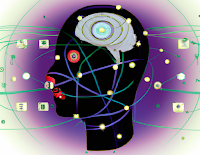Major types of artificial intelligence .
Major types of artificial intelligence .
 |
Artificial intelligence (AI) is a branch of computer science that involves creating intelligent machines that can perform tasks that typically require human intelligence, such as visual perception, speech recognition, decision-making, and language translation.AI is the simulation of human intelligence processes by machines, especially computer systems, with the aim of creating systems that can learn, reason, and solve problems.There are several types of artificial intelligence, each with its own strengths and limitations.
Major types of artificial intelligence
Reactive Machines
Reactive machines are the most basic type of artificial intelligence. They can only react to the environment based on a set of predefined rules. They do not have the ability to learn from past experiences or make predictions for the future. These machines are commonly used in applications such as robotics, where they are programmed to perform specific tasks based on input from sensors.
One example of a reactive machine is the Deep Blue computer, which defeated world chess champion Garry Kasparov in 1997. Deep Blue
was programmed to evaluate millions of possible moves in a fraction of a second to determine the best move to make based on the current state of the game.
Limited Memory AI
Limited memory AI builds upon reactive machines by adding the ability to learn from past experiences. These machines are able to store information from previous interactions with the environment and use that information to make better decisions in the future. However, they are still limited in their ability to make predictions for the future.
An example of limited memory AI is self-driving cars. These cars use sensors to gather information about their surroundings and use that information to make decisions about how to navigate the road. They also use machine learning algorithms to improve their decision-making abilities based on past experiences.
Theory of Mind AI
Theory of mind AI is a type of artificial intelligence that is able to understand the thoughts and feelings of other beings. These machines have the ability to empathize with humans and understand their emotional states. This type of AI is still in the early stages of development and is not yet widely used.
One example of theory of mind AI is the Kismet robot developed by MIT. Kismet was programmed to recognize and respond to human emotions based on facial expressions, body language, and tone of voice. It was able to express its own emotions through facial expressions and sounds.
Self-Aware AI
Self-aware AI is a type of artificial intelligence that has consciousness and the ability to think and reason like a human being. This type of AI is still in the realm of science fiction and has not yet been achieved.
One example of self-aware AI is the fictional character Data from the Star Trek series. Data was an android who was programmed to have emotions and the ability to reason like a human being. He was able to learn from his experiences and make decisions based on that knowledge.
Artificial General Intelligence (AGI)
Artificial general intelligence (AGI) is the hypothetical ability of a machine to perform any intellectual task that a human can. This type of AI would be capable of understanding any intellectual task that a human can and would be able to learn any intellectual skill that a human can.
AGI is still a long way off from being achieved. It is the subject of ongoing research in the field of artificial intelligence, and many experts believe that it will be many years, if not decades, before we are able to create machines with true AGI.
Artificial Superintelligence (ASI)
Artificial superintelligence (ASI) is a hypothetical level of intelligence beyond that of human beings. This type of AI would be able to think, reason, and learn at a level far beyond that of any human being.
ASI is the subject of much debate and speculation in the field of artificial intelligence. Some experts believe that the development of ASI could lead to a technological singularity, a point in time when machines become so intelligent that they are able to improve themselves at an exponential rate, leading to an unstoppable and potentially dangerous level of intelligence.
#AIRevolution #TypesOfAI #FutureTech
#FutureofAI #AIExplained #AIUseCases













Post a Comment